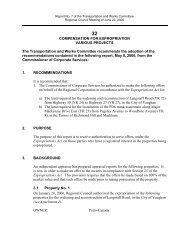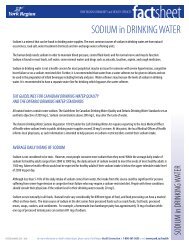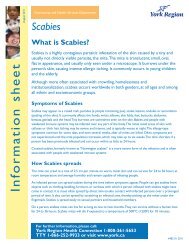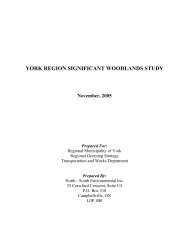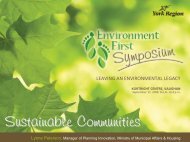Changing Landscapes: Recent Immigrants Living in York Region
Changing Landscapes: Recent Immigrants Living in York Region
Changing Landscapes: Recent Immigrants Living in York Region
You also want an ePaper? Increase the reach of your titles
YUMPU automatically turns print PDFs into web optimized ePapers that Google loves.
<strong>Recent</strong> immigrants were most affected<br />
dur<strong>in</strong>g the recent economic downturn<br />
The 2009 Labour Force Survey <strong>in</strong>dicated that<br />
recent immigrants liv<strong>in</strong>g <strong>in</strong> Ontario fared the<br />
worst dur<strong>in</strong>g the 2008/2009 recession and have<br />
been slower to recover from unemployment.<br />
Unemployment rates dur<strong>in</strong>g the recession, for<br />
immigrants aged 15 and over <strong>in</strong> Ontario who landed<br />
<strong>in</strong> Canada <strong>in</strong> the last five years, were reported at<br />
12.9 per cent <strong>in</strong> October 2008 and 16.6 per cent<br />
<strong>in</strong> August 2009. This is compared to 5.9 per cent<br />
<strong>in</strong> October 2008 and 8.9 per cent <strong>in</strong> August 2009<br />
for Canadian-born <strong>in</strong>dividuals (Source: Statistics<br />
Canada, Labour Force Survey, 2008 to 2009).<br />
While the unemployment rates of Canadianborn<br />
<strong>in</strong>dividuals and established immigrants <strong>in</strong><br />
Ontario were levell<strong>in</strong>g off, the unemployment<br />
rate for recent immigrants cont<strong>in</strong>ued to rise<br />
and peaked at 21.2 per cent <strong>in</strong> October 2010.<br />
At the same time, the unemployment rates for<br />
established immigrants were very similar to that<br />
of Canadian-born <strong>in</strong>dividuals (8.0 per cent and 7.8<br />
per cent respectively). As of October 2010, recent<br />
immigrants <strong>in</strong> Ontario had unemployment rates<br />
2.72 times that of Canadian-born <strong>in</strong>dividuals –<br />
among the highest <strong>in</strong> the country (Source: Statistics<br />
Canada, Labour Force Survey, 2010).<br />
<strong>Recent</strong> immigrants who take a “survival<br />
job” as their first job risk los<strong>in</strong>g their<br />
skills<br />
Many recent immigrants feel the pressure to f<strong>in</strong>d<br />
“any job” upon arrival to earn an <strong>in</strong>come and beg<strong>in</strong><br />
to establish themselves <strong>in</strong> Canadian society. If they<br />
are unable to f<strong>in</strong>d a job <strong>in</strong> their occupation, after<br />
a few months they often turn to a lower skilled<br />
occupation. Research has shown that this means the<br />
<strong>in</strong>dividual often loses his or her skills and is unable<br />
to f<strong>in</strong>d a job <strong>in</strong> their occupation afterwards (M<strong>in</strong>istry<br />
of Tra<strong>in</strong><strong>in</strong>g, Colleges and Universities, 2002).<br />
WHAT DOES THIS MEAN:<br />
employment and <strong>in</strong>come are measures of <strong>in</strong>tegration and <strong>in</strong>dicators of the degree of<br />
vulnerability of a population. The f<strong>in</strong>d<strong>in</strong>gs have implications for services, supports and<br />
social assistance as well as hous<strong>in</strong>g, transportation and education.<br />
» Employers need to match the skills, tra<strong>in</strong><strong>in</strong>g, education and knowledge of recent immigrants with<br />
suitable employment.<br />
» Employment and settlement services are most critical <strong>in</strong> the first few years after immigration.<br />
<strong>Chang<strong>in</strong>g</strong> <strong>Landscapes</strong>: <strong>Recent</strong> <strong>Immigrants</strong> <strong>Liv<strong>in</strong>g</strong> <strong>in</strong> <strong>York</strong> <strong>Region</strong><br />
38




